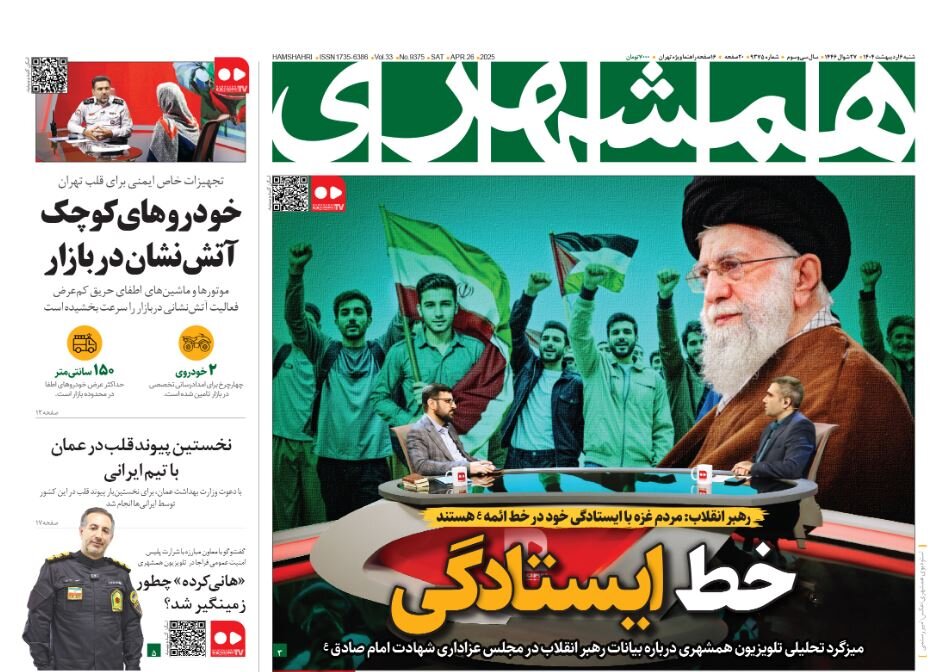Araghchi's warning to the Israelis

TEHRAN - In a note, Hamshahri addressed Araghchi's warning to the Israelis amid the negotiations and wrote: On Wednesday, Iranian Foreign Minister Abbas Araghchi warned on his X account about possible Israeli sabotage acts or assassinations during the Iran-U.S. nuclear talks.
Israel has a long history of sabotage acts during the nuclear talks; Araghchi's warning came at a time when the Iran-U.S. nuclear talks in Rome and Muscat have made progress. The negotiations, which may reach a new stage with the start of expert talks, seem to have raised concerns in Israel. Israel, which suffers from the illusion that Iran's nuclear program poses an existential threat, has a long history of trying to disrupt such talks. Araghchi’s warning came due to the history of Israeli sabotage acts, intelligence from Iranian security agencies, and media speculation about possible moves by Tel Aviv.
Arman-e-Emrooz: A fateful Saturday for Iranian diplomacy
Arman-e-Emrooz devoted its headline to the start of the third round of talks on April 26. The paper said: Iranian negotiators arrived in Muscat on Saturday to hold the third round of talks with U.S. representatives in the capital of Oman. So far, Iranian and U.S. leaders have expressed satisfaction with the talks, but the U.S. secretary of state recently said that Iran must stop enriching uranium and import nuclear fuel from abroad. Iran has declared that its right to enrich uranium is non-negotiable and insisted it will not back down. While Donald Trump has repeatedly said that “Iran must not obtain a nuclear weapon” and has introduced this as his red line, officials in his administration still differ on the details of this policy. According to Esmail Baghaei, the spokesman for the Ministry of Foreign Affairs, Iran is determined to protect the legal and legitimate rights of its people to use nuclear energy for peaceful purposes, and at the same time, it is ready to take reasonable steps to fully assure the peaceful nature of its nuclear program.
Ettelaat: Purpose of Araghchi's trips to Russia and China during the negotiations
Ettelaat discussed Araghchi's trips to Russia and China by interviewing political expert and former legislator Heshmatollah Falahatpisheh. He said: The primary purpose of these trips is to show how difficult the negotiations between Iran and the United States are. Unfortunately, due to a mistake that was made in the past, Iran had linked a large part of its nuclear negotiations to Western and Eastern mediators, and now we see that by the will of the Americans, the Eastern mediators, namely China and Russia, have been removed from the negotiations, but the Western mediators, namely Europe, are playing the role of a "stick" in the negotiations between Iran and the United States with a weapon called the "snapback mechanism." During his visit to France, the U.S. Secretary of State asked the country's officials to keep this stick active. Therefore, the Americans want Iran to be in a tight spot in order to gain maximum points. Therefore, Iran is trying to keep the Eastern parties as its supporters in the negotiations by making such trips. In the current situation, an action that involves a political or economic action can strengthen Iran's position.
Shargh: Another step forward
In an analysis, Shargh addressed Araghchi's proposal to resume diplomacy with the European troika and wrote: The proposal to negotiate with the European troika can be analyzed from two points of view. First, this proposal could be a sign of Tehran's concern about the European troika activating the snapback mechanism. In any case, the snapback mechanism, which can automatically restore international sanctions, is a serious threat to Iran. Araghchi's proposal to negotiate and travel to European capitals may be a strategic attempt to open the door to dialogue to dissuade London, Berlin, and Paris from taking action against Iran at this meeting. Second, Araghchi’s proposal could be interpreted as a continuation of Iran’s policy of de-escalation with the West, which has recently been observed in its interactions with the United States and the International Atomic Energy Agency. After making progress in negotiations with Washington and cooperating with the Agency, Iran may now want to extend this approach to relations with the European troika. Araghchi’s reference to successful consultations in Moscow and Beijing and his readiness to travel to Europe indicate an attempt to create a broader diplomatic framework.
